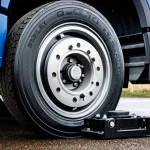Exploring Tire Material Types and Their Composition
Understanding tire materials is crucial to selecting the best tire for UK driving conditions. Most tires combine rubber compounds such as natural and synthetic rubber, enhanced with fillers like silica blends and carbon black. Natural rubber offers excellent elasticity and resistance, improving grip on wet roads—vital for the often damp UK climate. Synthetic rubber enhances durability and heat resistance, ensuring tires withstand fluctuating temperatures and long drives.
Silica blends are particularly noteworthy. They improve the tire’s ability to grip wet surfaces and reduce rolling resistance, boosting fuel efficiency. In UK weather, where rain is common, tires with higher silica content perform better by maintaining traction without sacrificing tread life. Carbon black, another key component, reinforces the rubber, providing strength and protecting against wear under variable driving conditions.
Also to discover : Mastering hatchback side mirror adjustments: a complete guide to enhancing blind spot safety
The balance of these materials in a tire affects not only grip and durability but also noise and comfort levels, all important for daily UK driving. Tires with optimized rubber compounds and advanced silica blends offer drivers improved safety and performance regardless of seasonal weather changes. This composition insight helps buyers make informed choices tailored to the UK’s unique road and climate challenges.
Tire Material Performance in Rain, Snow, Heat, and Cold
Understanding grip in wet conditions is crucial for safe driving, especially in climates with frequent rainfall. Tires use specialized rubber compounds blended with silica to enhance traction on wet roads. Silica improves water dispersion, reducing the risk of aquaplaning by allowing the tread to channel water effectively. This balance between rubber flexibility and silica’s water-repelling properties ensures consistent contact with slippery surfaces.
Also read : Mastering 4wd tire rotation: tips for even wear and improved safety across any terrain
In snow and colder temperatures, winter tire compounds are engineered differently. These compounds remain soft and pliable even below freezing, providing superior grip on icy or snowy UK roads. Unlike summer tires, which harden in cold, winter tires maintain tread flexibility that improves braking and handling. This is vital for UK winter conditions, where road temperatures often hover near freezing.
During warmer months, summer tire performance focuses on heat resistance and tread stability. Tires must endure high road temperatures without degrading or losing grip. The tread compounds used in summer tires minimize wear while offering excellent handling on dry and wet surfaces.
All-season tires aim to balance these traits, offering moderate wet grip, cold weather flexibility, and heat resistance, but they typically do not match the specialized performance of winter or summer tires in extreme conditions.
Durability, Safety, and Fuel Efficiency Across UK Weather
Understanding tire durability in UK conditions means selecting compounds that balance tread life with performance in varied climates. UK roads often face a mix of wet, cold, and occasionally icy conditions, demanding tires with compounds resistant to rapid wear yet flexible enough to maintain grip. Modern tire compounds incorporate silica and synthetic rubbers to enhance tread life while adapting to temperature swings, significantly improving longevity on British roads.
From a safety perspective, compound choice affects braking and handling. Softer compounds provide better traction on wet surfaces, critical for UK’s frequent rain, but may wear faster. Conversely, harder compounds last longer but reduce grip, impacting stopping distances. Manufacturers often blend materials to strike an optimal balance: maintaining grip in wet conditions without sacrificing tread durability or safety.
Low rolling resistance tires, designed with special materials and tread designs, reduce friction between tire and road. This innovation lowers the force needed to roll, decreasing fuel consumption impact on typical UK journeys. This is particularly beneficial for stop-start city driving or long-distance motorway trips. Efficient compounds in these tires contribute to both cost savings and reduced emissions, aligning with eco-conscious British drivers’ expectations.
Comparative Test Results and Expert Analysis
Various tire testing UK and European studies have assessed the all-season performance of different tire materials under real-world conditions. These tests consistently evaluate grip, wear resistance, and wet-weather handling to determine how tire compounds perform across diverse environments. The findings reveal that seasonal adaptability often depends on a balance between rubber flexibility and tread design, which influences both safety and longevity.
Automotive engineers highlight that softer compounds offer improved traction in cold or wet conditions but can wear faster in warm weather. Conversely, harder materials provide durability but may compromise grip, especially on slippery surfaces. These trade-offs emerge clearly in expert tire reviews focusing on all-season tires, where neither extreme hardness nor softness alone is ideal.
Experts emphasize the importance of choosing tires based on typical driving conditions. For example, those facing frequent wet roads might prioritize traction-enhancing materials, while drivers in milder climates may benefit from more durable compounds. Real-world tire studies conducted by UK testing agencies use controlled simulations combined with road trials, delivering objective comparisons that help consumers and professionals make informed choices. Such comprehensive analyses underscore the nuanced relationship between material science and practical tire performance.
Recommendations for Choosing Tire Materials for the UK Climate
Optimizing performance for unpredictable weather
Selecting the best tires for UK weather requires balancing safety, durability, and adaptability to wet, cold, or mildly snowy conditions. UK drivers should prioritize tire materials that maintain grip on damp roads and resist wear from frequent temperature shifts. Tires composed of a silica-enhanced compound excel in wet traction while preserving flexibility in cooler temperatures, making them a practical choice.
For year-round performance, all-season tires with a balanced tread compound are recommended. These tires blend rubber formulations that optimize grip on wet and dry surfaces but can handle occasional frost without hardening. UK drivers often find that tires labeled as “all-weather” perform better than standard all-season ones because they include specific additives improving cold-weather responsiveness.
In terms of tire material recommendations, look for products featuring advanced polymers that enhance tread elasticity. This directly improves control on slippery UK roads. Additionally, tires designed with deeper grooves, combined with a resilient compound, reduce hydroplaning risks, a crucial safety factor given the UK’s frequent rainfall.
By focusing on these factors, drivers can choose the best tires UK weather demands, improving safety and vehicle efficiency throughout the year.


